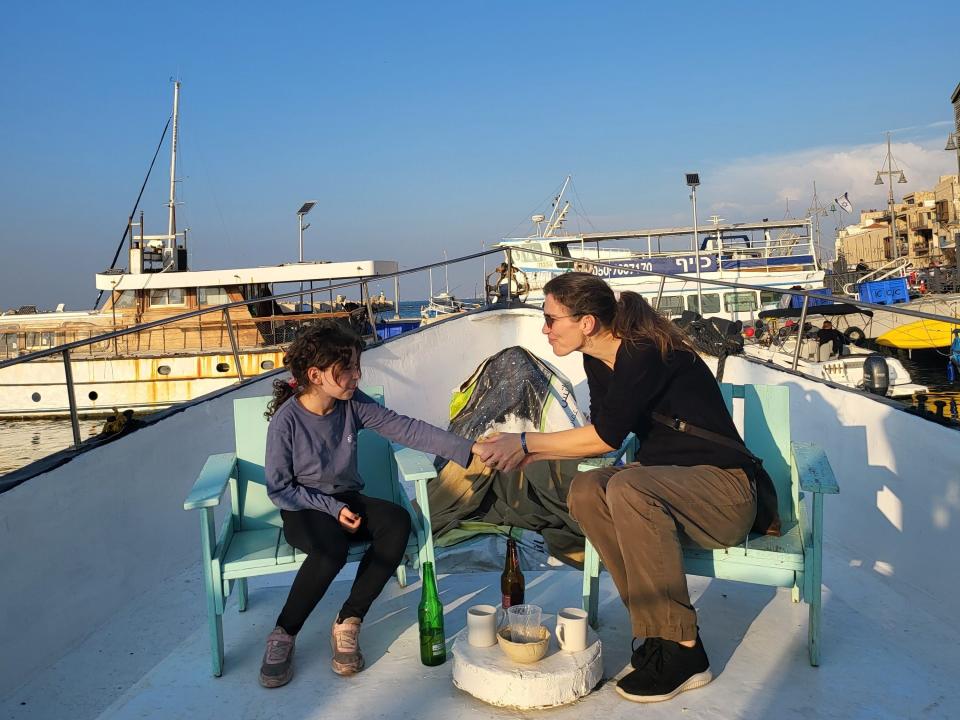I'm a mom of 3 in Israel. Every time my daughter walks into the room, I turn off the news.
Deborah Danan and her husband are working parents, raising their three kids in Israel.
They live in a mixed city where Jews, Muslims, and Christians live together.
She's been surprised by her 8-year-old's capacity for both compassion and comprehension of what was happening.
I've learned surprising truths about my children since the horror of the October 7 terror attack on Israel and the ensuing war in Gaza.
I live with my husband and three kids in a mixed city in Israel, where Jews, Muslims, and Christians live together. I moved here over a decade ago from Jerusalem.
Jerusalem, while officially considered a mixed city, largely consists of religiously homogeneous neighborhoods, making apartment blocks with Jews, Muslims, and Christians living together — like mine — far less common.
I love the diversity in my city. I love that my children attend Christmas parades and are aware of the fact that as I write this essay on a June afternoon, our neighbors are celebrating the Muslim holiday of Eid al Adha. But like everything else in this neck of the woods, living side by side can sometimes be fraught with complexities.
When news started emerging of what took place on October 7, I did everything in my power to protect my three children, especially my eldest, a highly sensitive 8-year-old with a string of acronyms after her name that point to her various diagnoses. I made sure that in any room she entered, the news was switched off — no small feat in a country where news consumption is basically a national pastime. I would stifle any conversation about the situation by family members that was within her earshot.
I was terrified of scarring her for life
I only let her know that hostages had been taken into Gaza after half of them — including almost all of the children among them — were released, more than 50 days into the war.
But then came the day when she was home alone in our apartment during a rocket siren. It was inevitable, really. Rockets were raining down on our city on a daily basis, and my work as a journalist meant that I was often out of the house.
My husband also found himself working around the clock when his boutique hotel, like many others across the country, was converted overnight into semi-permanent housing for some of the 300,000 internal refugees fleeing Israel's northern and southern borders, which were under attack.
On that day, I called my daughter as soon as the Code Red app on my phone bleeped, alerting me to an incoming projectile. She told me that she was trying to close the iron blast door of the safe room but that it was too heavy for her. She said it matter-of-factly. I tried to mask the rising panic in my voice as I told her to try again, harder this time.
It was useless, so I told her to go into the stairwell of our building, where there were no windows and less risk of falling shrapnel. Buildings erected in Israel since the 1990s have built-in safe rooms to avoid bombs and air strikes. For many Israelis living in older apartments, without safe rooms, this is the standard refuge from rocket fire.
My Arab Muslim neighbor saw her on the way to the stairwell. She took her hand and guided her to her own safe room, where she looked after her until I returned. To my relief — and surprise — my daughter was completely unfazed by the whole episode.

Adjusting to the new normal
Now, nearly 9 months after the October 7 attacks, we've settled into a routine. Schools in most of the country are operating, people are going out, life is continuing — but the reminders that life is anything but normal are everywhere, puncturing the facade: from posters of hostages on every tree to the almost daily news of the deaths of loved ones to the imminent threat of a new war on a different front.
But while even the most inconsequential event is cloaked in pain, I'm fully aware that my day-to-day as a mother is peachy compared to mothers in Gaza.
In the midst of it all, I find myself still torn between a duty to let my children know what's happening around them — to allow them to grow thick-skinned, to build resiliency, and hopefully, to seek solutions — and the instinctual urge to shelter them, not just from rocket fire but from things I think children should never have to know.
The night of the rocket fire, my daughter and I lay in bed. I spoke to her about our Arab friends and neighbors and what it means for them to be straddling a precarious duality in which they are scared about their own well-being, as Israeli citizens under fire, as well as that of their people — sometimes even family members — under bombardment in Gaza.
I asked her to imagine that right now in Gaza, there was probably a girl of her age who may be scared for her life. And that maybe that girl has a cousin who lives right here, in our neighborhood.
My daughter's capacity for both compassion for their plight and comprehension of what was happening right now, right here, to us, astonished me and continues to astonish me.
Read the original article on Business Insider

